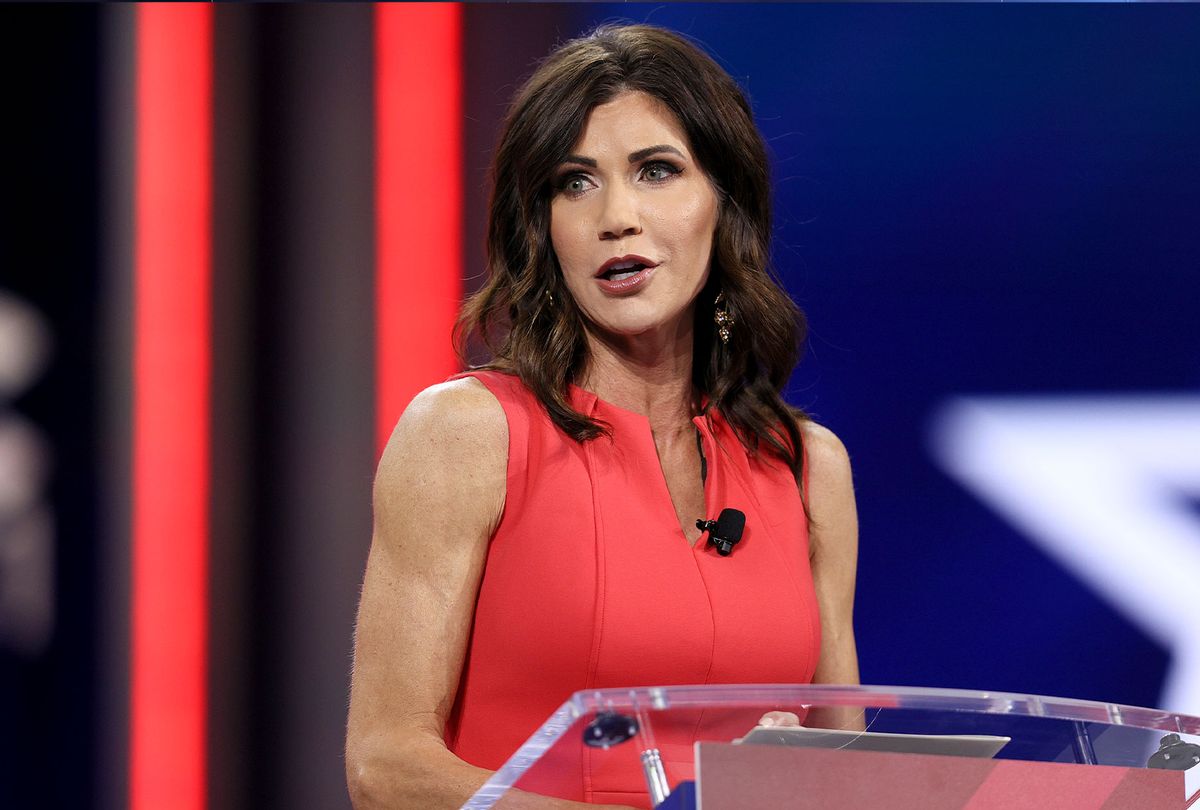Two weeks after South Dakota Gov. Kristi Noem signed a law banning transgender students from joining sports teams that match their gender identity, the Republican came under fire Thursday for her apparent ignorance of difficulties faced by many LGBTQ+ people.
During a press briefing, reporter Kyle Ireland asked Noem: "There's a statistic circling around right now that 90% of South Dakota's LGBTQ community is diagnosed with either anxiety or depression. Why do you think that is?"
The governor responded: "I don't know. That makes me sad and we should figure it out."
The National Center for Lesbian Rights (NCLR) shared a video of the exchange on Twitter and noted that discriminatory policies like the one Noem approved earlier this month "can be directly correlated to anxiety, depression, and even suicidal ideation" in LGBTQ+ youth.
The NCLR also highlighted that similar measures are being considered and enacted in several other states, and reiterated that such policies "will have LONG-TERM and SERIOUS ramifications for the mental health and well-being" of the young people targeted.
Congresswoman Marie Newman (D-Ill.)—who has a trans daughter—also responded to Noem's comments on Twitter.
"Really? Last year was the deadliest on record for transgender Americans. You just passed a discriminatory bill that attacks trans kids who just want be themselves and play sports," Newman said. "Want to figure out why LGBTQ+ youth are more prone to depression? It's because of people like you."
After Noem—who is widely considered a leading candidate for the GOP's 2024 presidential primary race—signed the anti-trans measure, Cathryn Oakley of Human Rights Campaign (HRC) said her "eagerness to pass a bill attacking transgender kids reveals that her national political aspirations override any sense of responsibility she has to fulfill her oath to protect South Dakotans."
"Gov. Noem and South Dakota legislators need to stop playing games with vulnerable children," added HRC's legislative director and senior counsel. "Transgender children are children. They deserve the ability to play with their friends. This legislation isn't solving an actual problem that South Dakota was facing: It is discrimination, plain and simple. Shame on Gov. Noem."
Last year, according to HRC, legislators introduced more than 250 anti-LGBTQ+ measures in 31 states and enacted 17 laws in 10 states. As Common Dreams reported last week, Republican lawmakers continue to pursue such policies, despite warnings about the impact.
Polling published in August 2020 by Morning Consult and the Trevor Project found that LGBTQ+ youth "are significantly more likely than straight/cis youth to exhibit symptoms of depression, anxiety, and/or both."
Of the 600 LGBTQ+ people ages 13-24 who were surveyed, 55% reported symptoms of anxiety, 53% reported symptoms of depression, and 43% reported symptoms of both in the two weeks preceding the survey. The figures were even higher for trans and nonbinary youth, at 69%, 66%, and 61%, respectively.
Amit Paley, CEO and executive director of the Trevor Project, said at the time that "we've known that LGBTQ youth have faced unique challenges because of the countless heartbreaking stories we've heard on our 24/7 phone lifeline, text, and chat crisis services; but these findings illuminate the existence of alarming mental health disparities that must be addressed through public policy."

Shares